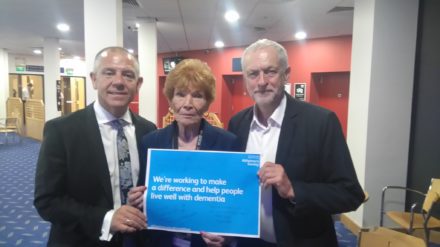
Mary Turner, GMB president, and George McNamara, head of policy and public affairs, Alzheimer’s Society
This week’s GMB Congress saw delegates back plans for the union to campaign on dementia, holding their first ever Dementia Friends session in Bournemouth. We used the event to set out the opportunity this campaign presents to ensure that the rights of people with dementia and carers are recognised and protected at work.
Delegates at GMB Congress, representing the union’s 640,000 members from different industries and walks of life across the country, set out their support for a new GMB campaign focused on dementia. GMB will work with leading dementia charity Alzheimer’s Society to campaign for better understanding of dementia; increased support for unpaid family carers; and more specialised dementia hospital care.
This is a welcome development for both our organisations, and we believe that the moral and economic case for this work could not be stronger. During Congress this week we also met Jeremy Corbyn (above, with Mary and GMB general secretary Tim Roache) and welcomed his commitment to join us in the fight against dementia. Because when it comes to dementia, workers’ rights and carers’ rights go hand in hand.
Typically, when we imagine a person with dementia, we see a frail, elderly person, in their 70s, 80s or even 90s, and probably in the late stages of the condition. But 40,000 people are currently living with dementia in the UK who are under the age of 65. They might be in their 30s, 40s or 50s, many of them are workers and will wish to remain in work after a diagnosis. Employers have a duty to them to do all they can to make this possible, and make suitable adjustments and adaptations to allow this.
This is vital not only in terms of workers’ rights and the way any of us should be able to expect to be treated by our employers, but also as part of a wider issue. Alzheimer’s Society research shows that people fear dementia more than any other condition or disease. In no small part this is because of the perception that a dementia diagnosis instantly means losing your independence, livelihood, hobbies, and friends. We believe that with the right support, it is possible to live well with dementia. Living well means something different to every person. However, by showing that it is possible to remain in your job with a dementia diagnosis, by people seeing this first-hand in their workplaces, we go a long way to smashing perceptions about what dementia means.
But it is not only people with dementia we will be campaigning for. Aptly, Congress this year fell during Carers Week. Unpaid carers provide £11.6bn worth of care for people with dementia a year. These are usually children, grandchildren, nieces or nephews , often trying to balance their work commitments with caring responsibilities. The needs of people with dementia are complex, and navigating the health and social care system can be even more so, frequently requiring accessing to tens of different agencies and organisations in order to access ongoing support. Yet at present, family carers have no guarantees that they will have the support of their employer in fulfilling their family duties.
Time and again we hear the stories anecdotally about the impact of this on working people, such as one woman in the North West – herself working in adult social services for a local council – who was forced to leave her job because her employer couldn’t grant her the flexibility she needed to care for her dad with dementia alongside her job. We will stand up for carers and fight for better workplace recognition of the support that they need.
Amongst the workers GMB represents are many in the care home sector, doing a vital job of caring for people with dementia – too often with low pay, poor working conditions, and lacking the respect they deserve for the job they do. By raising awareness of what dementia is, and the care and support people with dementia need, we shine a light on their work. A key element of our campaigning together must be for more specialist, high quality care – but we will only achieve this if those working in the sector feel they are part of a valued profession, with the rights, terms and conditions that go alongside this.
Beyond those GMB members directly working in this area, one of the strengths of our planned joint work in in the sheer size of GMB membership. Most of us, in some way will be affected by dementia at some point in our lives. The more we can do to increase understanding and awareness of dementia amongst GMB’s 640,000 members, the more we are all set to benefit as a result.
Over the coming months our organisations will be working together to develop and set out a joint plan of action to take forward the wishes of GMB delegates, transforming attitudes, experiences and rights around dementia.
For more information contact [email protected]



More from LabourList
2024 local election results: Live updates on key races for Labour as counts begin
Ian Murray: ‘John Swinney offers nothing new – Scotland can send a government to Westminster, not just a message’
Local elections 2024: Live polling day updates as activists urged to give mayor candidates final push